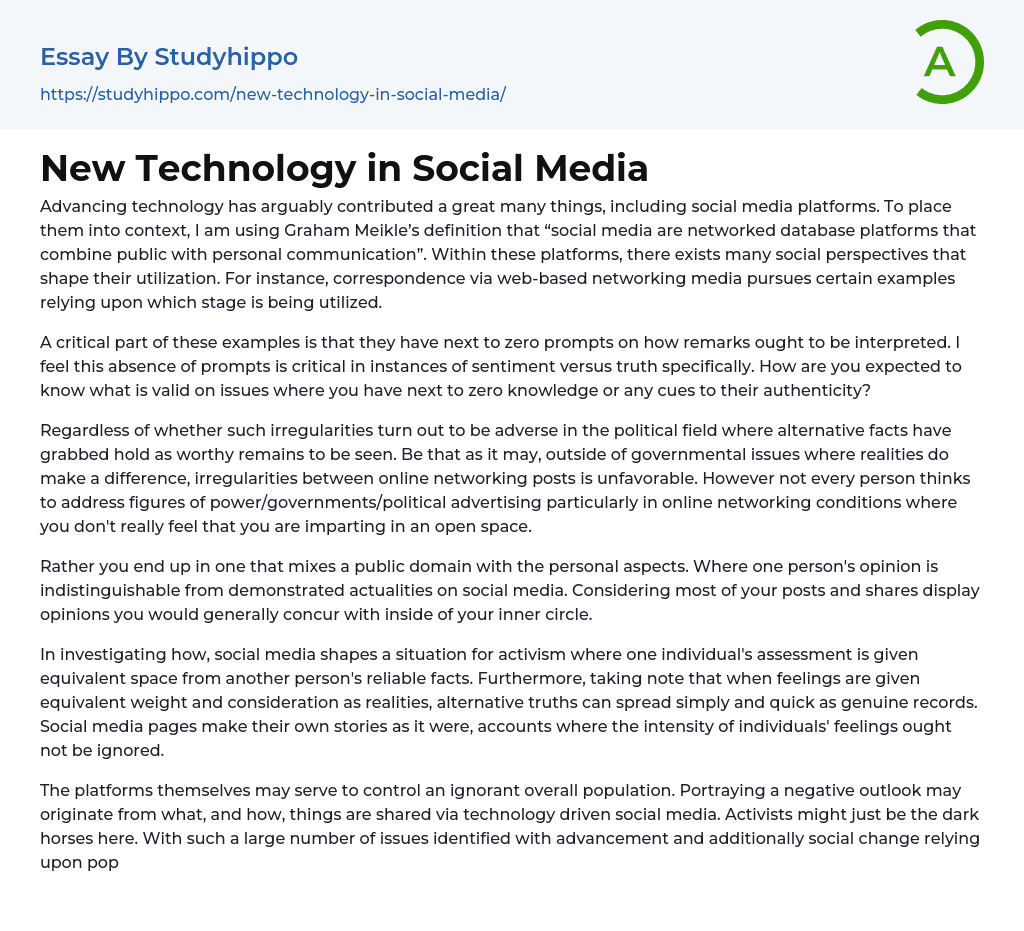The rise of technology has potentially brought forth numerous developments, one of which being social media platforms. To provide context, I will refer to Graham Meikle's definition stating that "social media are networked database platforms that combine public with personal communication". These platforms encompass diverse social perspectives that influence how they are used.
For example, communication through social media platforms follows specific patterns depending on the platform being used. A crucial aspect of these patterns is the lack of clear guidelines on how comments should be interpreted. I believe this lack of guidance is particularly significant when it comes to differentiating between opinion and truth. How can you determine what is true when you have limited knowledge or any cues about its authenticity? Whether these inconsistencies become detrimental in politics, where alternative facts have become accepted, re
...mains to be seen. However, outside of politics where facts do matter, discrepancies in social media posts are harmful.
However, not everyone considers addressing figures of power, governments, or political advertising, especially in online networking environments where one does not feel like they are communicating openly. Instead, it feels like a blend of public space with personal aspects. In this space, one's opinion is indistinguishable from actual facts on social media, given that most posts and shares align with the opinions of one's inner circle. By examining how social media shapes a platform for activism, where individuals' opinions are given equal prominence to others' reliable facts, we can observe that when emotions are treated the same as facts, alternative truths can spread rapidly and easily.
Social media platforms create their own narratives, acting as virtual spaces where people's emotions and opinions hold
significant weight. These platforms can potentially manipulate the wider population by influencing how information is shared. The portrayal of negativity may result from the way technology-driven social media operates. Activists can be considered as unexpected influencers in this context. With numerous issues connected to progress and societal transformation relying heavily on popularity, it becomes inevitable to question the role of governments in shaping public opinion in order to maintain their control.
Furthermore, the effectiveness of activism in the current personal media environment is questioned. Irrespective of its content, political tweets that portray a positive perspective often selectively address specific issues while diverting attention from others. Consequently, this can influence the choices made by those who read them. Additionally, in a society where social media platforms are perceived as vulnerable to hacking, the impact of digital activism may diminish. Deciding whom to trust and whom not to believe has been a prominent aspect of human existence since our ancestors established complex societies.
In the realm of politics, there has always been deceitful individuals striving for personal gain. However, the main difference now lies in our information sources. We must find a new method to determine what is trustworthy. For those responsible for fabricating stories, the widespread sharing of these stories through social media allows them to profit from advertising revenue generated by people clicking on their website links.
Some may claim that by not taking action against false online content, we enable deceivers to freely propagate lies. It is crucial to hold these individuals responsible and thoroughly evaluate the validity of their statements. This phenomenon can be referred to as the era of alternative facts, wherein a perplexing array
of assertions and opposing arguments abound. In this environment, fictional narratives swiftly disseminate across social media platforms, eliciting passionate responses from those who unquestioningly embrace such information as genuine.
Search engines provide a platform for the most powerful individual on Earth to criticize mainstream media for spreading "fake news," highlighting controversial and fringe perspectives about US presidents. This situation appears to misguide voters by the very politicians they once supported, while even credible scientific research is ignored. Prominent researchers, tech companies, and fact-checkers emphasize that the significance of disseminating false information should not be underestimated.
Regarding social media, the content shared by the public may not always have a particular recipient in mind. Nevertheless, the information encountered on social media can have a notable influence. If one individual spreads false information, it may be shared by believers but not as much by skeptics. This raises concerns about motivating individuals to back specific causes. Does the lack of clear indications create doubt regarding the credibility of information, regardless of its reliability or foundation in alternative facts?
- Social Media Negative Effects essays
- Effects of Social Media essays
- Collaboration essays
- Dialogue essays
- Fake News essays
- Journalism essays
- Mass Media essays
- Media Analysis essays
- Media Bias essays
- Media Studies essays
- Message essays
- News essays
- Propaganda essays
- Radio essays
- Rogerian Argument essays
- Role of Media essays
- Social Media essays
- Social Media Marketing essays
- Social Networking essays
- Youtube essays




